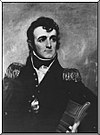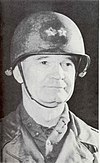| Name
|
Class year
|
Notability
|
References
|
| Joseph Gardner Swift
|
1802
|
Brigadier general; first graduate of the Academy; War of 1812; Superintendent of the Academy (1812–1814); Chief of Engineers (1812–1818)
|
[1]
|
| Walker Keith Armistead
|
1803
|
Brigadier general; War of 1812; Chief of Engineers (1818–1821)
|
[1]
|
| Joseph Gilbert Totten
|
1805
|
Major general; War of 1812, Mexican–American War, American Civil War; military and lighthouse engineer; Chief of Engineers (1838–1864)
|
[1]
|
| Charles Gratiot
|
1806
|
Brigadier general; War of 1812; Chief of Engineers (1828–1838)
|
[1]
|
| Richard Delafield
|
1818
|
Major general; 7th, 11th, and 13th Superintendent of the Academy (1838–1845), (1856–1861), (1861); American Civil War; Chief of Engineers (1864–1866)
|
[1]
|
| George Washington Whistler
|
1819
|
Major (United States); Chief Engineer that constructed the railroad between St. Petersburg and Moscow, Russia (1842); Received the Order of St. Anne from the Czar Nicholas (1847); father of the painter James Abbott McNeill Whistler (1834)
|
[1]
|
| Isaac R. Trimble
|
1822
|
Major General CSA; civil and railroad engineer; wounded and captured at the Battle of Gettysburg
|
[a][b][2]
|
| George S. Greene
|
1823
|
Brigadier general; second cousin of General Nathanael Greene of the American Revolutionary War; railroad and aqueduct engineer, founder of American Society of Civil Engineers and Architects; defender of Culp's Hill during the Battle of Gettysburg
|
[b][3][self-published source]
|
| Andrew A. Humphreys
|
1831
|
Major general; American Civil War; topographical and hydrological surveyor of the Mississippi River Delta; Chief of Engineers (1866–1875); an incorporator of the United States National Academy of Sciences
|
[1]
|
| Herman Haupt
|
1835
|
Brigadier general; railroad engineer and head of the United States Military Railroad during the American Civil War
|
[4]
|
| John Williams Gunnison
|
1837
|
Captain; topographical engineer; supervised one of the Pacific Railroad surveys in 1853; Gunnison, Colorado and Gunnison, Utah are named in his honor
|
[5][6]
|
| Horatio Wright
|
1841
|
Major general; American Civil War; Chief of Engineers (1879–1884)
|
[1]
|
| John Newton
|
1842
|
Brigadier general; American Civil War; coastal fortifications engineer; Chief of Engineers (1884–1886)
|
[1]
|
| John Pope
|
1842
|
Major general; topographic engineer and surveyor; Dakota War of 1862, Apache Wars; defeated at the Second Battle of Bull Run, commander of Army of the Mississippi and Army of Virginia
|
[b][7]
|
| William F. Raynolds
|
1843
|
Colonel; topographic engineer; Mexican–American War; American Civil War; lighthouse construction, led 1859–1860 Raynolds Expedition in Yellowstone region.
|
|
| James Chatham Duane
|
1848
|
Brigadier general; leader of engineers in the Utah War of 1858; American Civil War; coastal fortifications and pontoon engineer; Chief of Engineers (1886–1888)
|
[1]
|
| Robert S. Williamson
|
1848
|
Lieutenant colonel; American Civil War; topographical engineer; participated in the Pacific Railroad Surveys
|
[6]
|
| John Parke
|
1849
|
Major general; American Civil War; participated in the Pacific Railroad surveys in 1853; chief surveyor who delineated the boundary between northwestern United States and British North America; Superintendent of the Academy (1887–1889)
|
[8]
|
| Rufus Saxton
|
1849
|
Brigadier general; recipient of the Medal of Honor for his defense at the Battle of Harpers Ferry; participated in the Pacific Railroad surveys in 1853; early abolitionist
|
[9][10]
|
| Gouverneur K. Warren
|
1850
|
Major general; commended at the battle of Little Round Top, Chief of Engineers of the Army of the Potomac during the American Civil War; participated in topographical and railroad explorations of the Mississippi River and trans-Mississippi West
|
[11]
|
| Thomas Lincoln Casey
|
1852
|
Brigadier general; American Civil War; fortifications engineer; construction engineer of the Washington Monument and Old Executive Office Building; Chief of Engineers (1888–1895)
|
[1]
|
| William Price Craighill
|
1853
|
Brigadier general; American Civil War; fortifications, river, harbor, and coastal engineer; author; Chief of Engineers (1895–1897)
|
[1]
|
| Orlando Metcalfe Poe
|
1856
|
Brigadier general; American Civil War; lighthouse, harbor, and river engineer; responsible for much of the early lighthouse construction on the Great Lakes; built the Poe Lock of the Soo Locks in Sault Ste. Marie, Michigan; Poe Reef Light in Lake Huron is named in his honor
|
[12]
|
| Henry Martyn Robert
|
1857
|
Brigadier general; Pig War; American Civil War; fortifications, river, and harbor engineer; wrote Robert's Rules of Order; Chief of Engineers (1901)
|
[1]
|
| John Moulder Wilson
|
1860
|
Brigadier general; recipient of the Medal of Honor for his actions at the Battle of Malvern Hill despite acute illness; Superintendent of the Academy (1889–1893); Chief of Engineers (1897–1901)
|
[1][9]
|
| John W. Barlow
|
1861
|
Brigadier general; American Civil War; participated in topographical explorations of the headwaters of the Missouri River and Yellowstone River; Chief of Engineers (1901)
|
[1]
|
| George Lewis Gillespie, Jr.
|
1862
|
Brigadier general; recipient of the Medal of Honor for carrying dispatches under withering fire at the Battle of Cold Harbor; fortification and pontoon engineer; Chief of Engineers (1901–1904)
|
[1][13]
|
| David Porter Heap
|
1864
|
Brigadier general; engineer and author; harbor and lighthouse engineer
|
[14]
|
| Alexander Mackenzie
|
1864
|
Major general; American Civil War; torpedo, river, and harbor engineer; Chief of Engineers (1904–1908)
|
[1]
|
| William Louis Marshall
|
1868
|
Brigadier general; topographic and river engineer; Chief of Engineers (1908–1910)
|
[1]
|
| William Herbert Bixby
|
1873
|
Brigadier general; coastal and river engineer; Chief of Engineers (1910–1913)
|
[1]
|
| William Trent Rossell
|
1873
|
Brigadier general; fortification, harbor and river engineer; Chief of Engineers (1913)
|
[1]
|
| Dan Christie Kingman
|
1875
|
Brigadier general; fortification, harbor and river engineer; Chief of Engineers (1913–1916)
|
[1]
|
| William Murray Black
|
1877
|
Major general; Spanish–American War; civil engineer; Chief of Engineers (1917–1919)
|
[1]
|
| George Washington Goethals
|
1880
|
Major general; chief engineer of the Panama Canal; Governor of the Panama Canal Zone (1914–1917)
|
[15]
|
| Lansing Hoskins Beach
|
1882
|
Major general; river, harbor, and coastal engineer; Chief of Engineers (1920–1924)
|
[1]
|
| Harry Taylor
|
1884
|
Major general; World War I; fortification, river, and harbor engineer; Chief of Engineers (1924–1926)
|
[1]
|
| Edgar Jadwin
|
1890
|
Major general; Spanish–American War; World War I; river, bridge, and road engineer; Chief of Engineers (1926–1929)
|
[1]
|
| Lytle Brown
|
1898
|
Major general; Spanish–American War; Pancho Villa Expedition; World War I; civil engineer; Chief of Engineers (1929–1933)
|
[1]
|
| Edward Murphy Markham
|
1899
|
Major general; World War I; topographic and civil engineer; Chief of Engineers (1933–1937)
|
[1]
|
| Julian Larcombe Schley
|
1903
|
Major general; World War I; topographic and civil engineer; Governor of the Panama Canal Zone (1932–1926); Chief of Engineers (1937–1941)
|
[1]
|
| Raymond Albert Wheeler
|
1911
|
Lieutenant general; World War II; railroad and highway engineer; Chief of Engineers (1945–1949); directed the clearing of the Suez Canal following the 1956 Suez Crisis
|
[1][16]
|
| Lunsford E. Oliver
|
1913
|
Major general; initiated the research that led to the development of the steel treadway bridge; Commander of 5th Armored Division during World War II
|
[17]
|
| Hugh John Casey
|
1918
|
Major general; instructor and engineer company commander during World War I; Chief Engineer for General of the Army Douglas MacArthur for the South West Pacific theatre of World War II; initial designer of The Pentagon; father of Major Hugh Boyd Casey; father-in-law of Major General Frank Butner Clay
|
[18]
|
| Samuel D. Sturgis, Jr.
|
1918
|
Lieutenant general; World War II; railroad and highway engineer; Chief of Engineers (1953–1956)
|
[1]
|
| Emerson C. Itschner
|
1924
|
Lieutenant general; World War II; Korean War; civil engineer; Chief of Engineers (1956–1961)
|
[1]
|
| Walter K. Wilson, Jr.
|
1929
|
Lieutenant general; World War II; Chief of Engineers (1961–1965)
|
[1]
|
| William F. Cassidy
|
1931
|
Lieutenant general; World War II; airfield engineer and engineer logistician; Chief of Engineers (1965–1969)
|
[1]
|
| Frederick J. Clarke
|
1937
|
Lieutenant general; World War II; airfield engineer, engineer logistician, and early developer of the Red Ball Express; worked on the Manhattan Project; Chief of Engineers (1969–1973)
|
[1]
|
| William C. Gribble, Jr.
|
1941
|
Lieutenant general; World War II; civil and nuclear engineer; worked on the Alaska Highway; Chief of Engineers (1973–1976)
|
[1]
|
| John W. Morris
|
1943
|
Lieutenant general; World War II, Korean War, Vietnam War; airfield and river engineer; Chief of Engineers (1976–1980)
|
[1]
|
| Joseph K. Bratton
|
1948
|
Lieutenant general; Korean War, Vietnam War; Chief of Engineers (1980–1984)
|
[1]
|
| Fidel V. Ramos
|
1950
|
General; Korean War, Vietnam War; master's degree in civil engineering at the University of Illinois (1951); Chief of Staff of the United Nations engineering contingent during the Vietnam War
|
[19]
|
| Elvin R. Heiberg III
|
1953
|
Lieutenant general; Vietnam War; held three Master's degrees; Chief of Engineers (1984–1988)
|
[1]
|
| Henry J. Hatch
|
1957
|
Lieutenant general; Vietnam War; Paratrooper and Army Ranger; Chief of Engineers (1988–1992)
|
[1]
|
| Robert L. Van Antwerp, Jr.
|
1972
|
Lieutenant general; Gulf War; Paratrooper and Army ranger; Chief of Engineers (2007–present)
|
[1]
|










